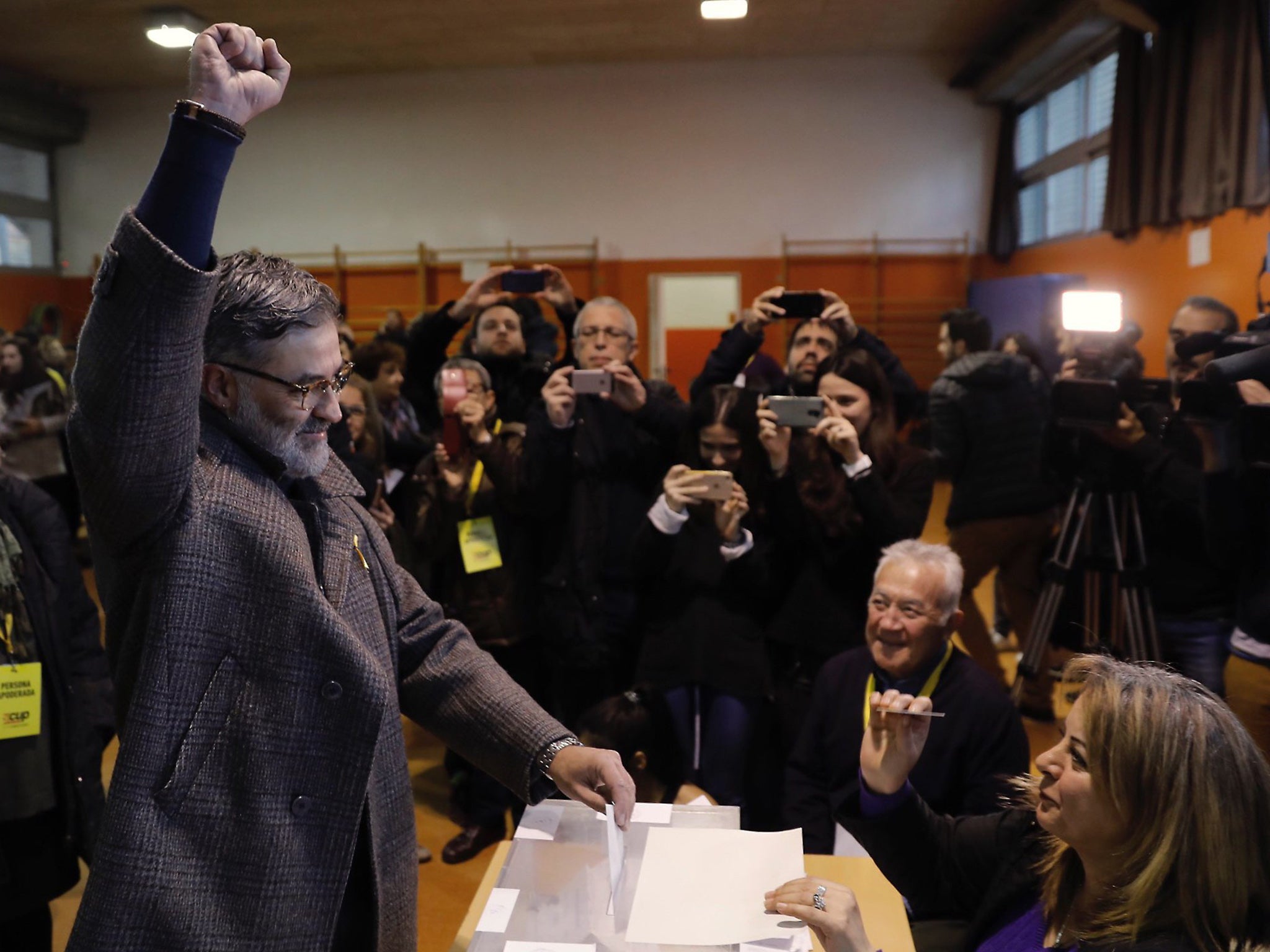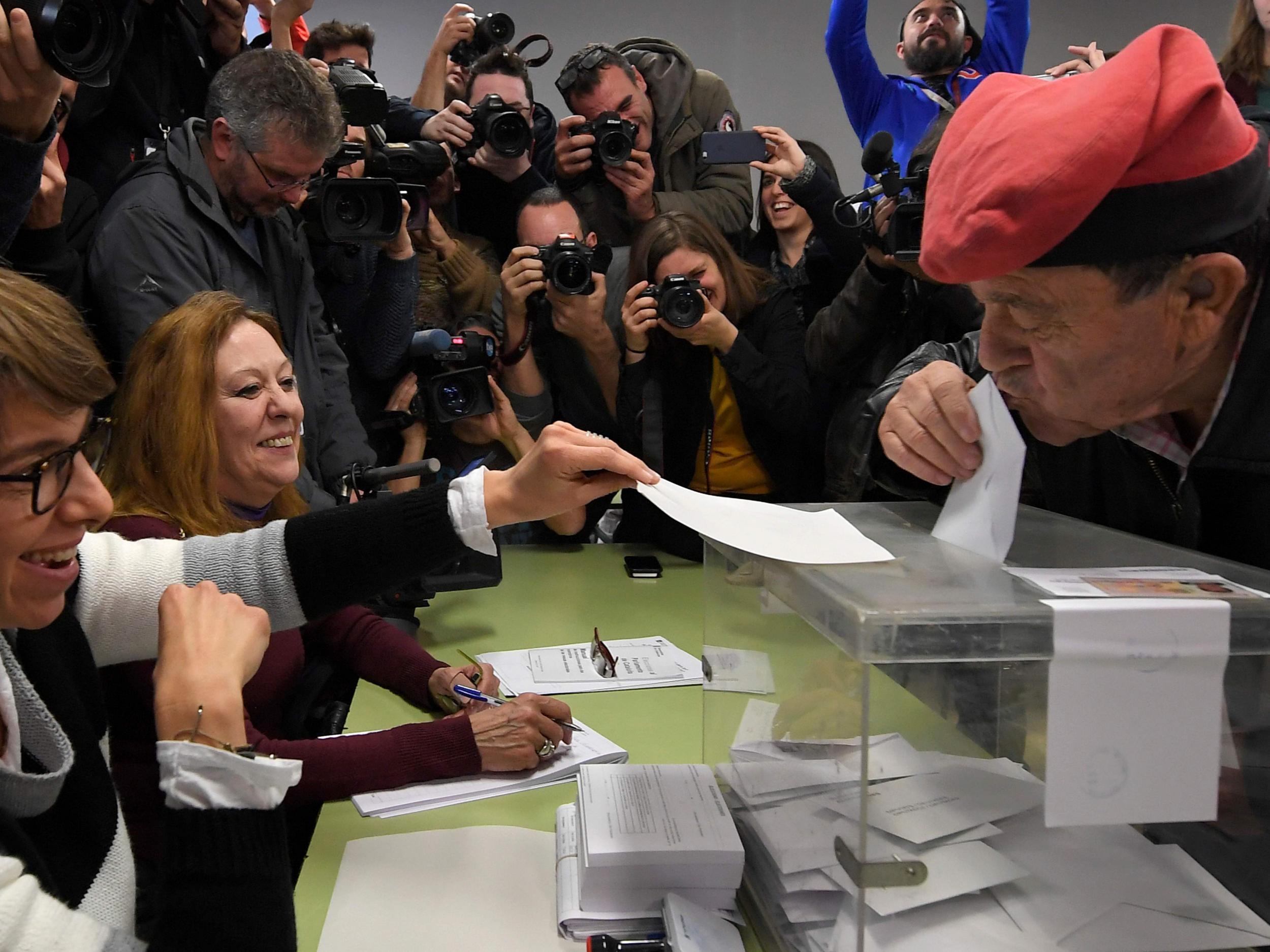Catalonia election: Surveys suggest pro-independence parties have narrow advantage as region votes in crucial poll
'I really do worry if we fail to form a government... the cause of freedom may be lost for years'

The election in Catalonia, of profound significance to the region, to Spain and to the European Union, has taken place with little hope of it bringing an early end to a bitter political crisis, but with recrimination over the past and unease for the future instead.
The turnout, after a volatile campaign which had been preceded by violence, was high as had been expected with queues forming outside some of the polling stations from early in the morning and almost half of the 5.5 million of those eligible voting by late afternoon.
None of the half-dozen contesting parties were expected to reach the 68 seats needed for an outright majority on their own. The final surveys indicated that the pro-independence Esquerra Republicana (ERC) and Junts Per Catalunya (JxCat) and the hard left CUP are likely to get between 62 and 66 seats while the unionist parties, Ciudadanos (Cs) the Socialist Party of Catalonia (PSC) and the Catalonian branch of Spain’s ruling Popular Party (PP) will get between 56 and 61 seats.

The polling in this extraordinary election, which may eventually lead to the creation of Europe’s newest country, takes place after vicious clashes in which hundreds of people were injured when the Spanish government sent in the Guardia Civil on 1 October to try and stop a referendum called by Catalan President Carles Puigdemont and his administration.
Mr Puigdemont is now in exile in Belgium with an arrest warrant issued against him by the Madrid government of Mariano Rajoy, and ERC head Oriol Junqueras in a Spanish jail. Ines Amrimadas, who leads Ciudadanos, has complained to the police after receiving numerous violent threats including one of gang rape.
The acrimony has spread among the parties, with differences not just on policies but among personalities, which may make forming coalitions difficult. Results were expected by late in the evening on Thursday, although they will not be officially declared until 5 January after postal and votes abroad are fully counted. The Catalan Parliament then has approximately a month to elect a speaker and a regional President.
Mr Puigdemont tweeted from Brussels: “Today we will demonstrate the strength of an indomitable people. May the spirit of 1 October guide us always.” He added later “this is not a normal day for democracy”. He has not been able to vote as he would have had to go into the Spanish embassy in Brussels to do so. Mr Junqueras said he had sent a postal vote from prison. He sent a note to his wife saying “today I wish to be with you and the children for more reasons than ever”. The couple will spend their fourth wedding anniversary apart because of his incarceration.
At the last rally of JxCat Mr Puigdemont had given a speech on a video link from Brussels. Nine seats on the front row were left empty with names of jailed Catalan leaders, including Mr Junqueras of ERC, attached. But the two parties have failed to agree to a joint ticket, as they had done in the previous regional election two years ago, and their leaders have been exchanging barbs. “I went to prison because I do not hide and I am consistent with my acts,” said Mr Junqueras in a radio interview. Mr Puigdemont’s response was: “I am in Belgium because I also do not hide and I am consistent.”
At a polling station in L’Hospitalet de Llobregat, a Barcelona suburb, Bernat Oliveras, who voted for JxCat appealed for the two leaders to bury their differences and form a coalition: “This is a great opportunity, a moment in history for the struggle for independence to be united. It would be really, really irresponsible to let this slip away because of any personal problems people have with each other. The people will never forget this if it happens.”
At the town of Arenys de Munt, where a referendum held eight years ago is viewed as the start of the current struggle for independence, Josep Sanchez Camps, chief of operations at the council, stated: “I really do worry if we fail to form a government and our opponents like the Peoples Party and the Socialists form one instead. The cause of freedom may be lost for years.”
Raquel Santiago, volunteering for the ERC in central Barcelona, described how the violence on the day of the referendum had boosted the backing for independence. She works for the Catalan Fire Service whose members, helping at the polling stations, were attacked by some of the Guardia Civil officers.
“Those scenes were horrible, people could see the pictures on TV and social media and they shocked people. A lot of people who had been against independence or simply weren’t interested in politics became supporters of independence on that day,” she said.
There had been allegations of vote rigging and Ms Santiago said she was being vigilant at the count: “It is the same party which had been doing things like this for a long time. I am quite observant and I am keeping my eyes open for any tricks. We are also watching out to see if they are telling people lies about the independence movement.”
But Walter Ziegler, a unionist supporter at the same polling station, charged that it was the separatists who were responsible for lies. “One big one is that Catalonia pays so much in tax to the central government and gets nothing back. The figures simply don’t support this. A lot of the taxes are local ones set up by the separatist government,” he held.
The pro-independence parties may be able to cobble together a coalition, Mr Ziegler, an architect, acknowledged. “If we end up in opposition we must be effective in scrutinising what they do, how much public money they spend on propaganda,” he wanted to stress. “This election is not the end of anything, there will be a lot to fight for in the future.”
Join our commenting forum
Join thought-provoking conversations, follow other Independent readers and see their replies
Comments
Bookmark popover
Removed from bookmarks